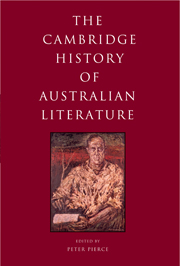Book contents
- Frontmatter
- Introduction
- FROM EUROPEAN IMAGININGS OF AUSTRALIA TO THE END OF THE COLONIAL PERIOD
- FROM THE LATE NINETEENTH CENTURY TO 1950
- 7 Australia’s Australia
- 8 The short story, 1890s to 1950
- 9 Australian drama, 1850–1950
- 10 ‘New words come tripping slowly’: Poetry, popular culture and modernity, 1890–1950
- 11 Australian fiction and the world republic of letters, 1890–1950
- 12 Australia’s England, 1880–1950
- TRAVERSES
- FROM 1950 TO NEARLY NOW
- Select bibliography
- Index
- References
10 - ‘New words come tripping slowly’: Poetry, popular culture and modernity, 1890–1950
from FROM THE LATE NINETEENTH CENTURY TO 1950
Published online by Cambridge University Press: 28 May 2011
- Frontmatter
- Introduction
- FROM EUROPEAN IMAGININGS OF AUSTRALIA TO THE END OF THE COLONIAL PERIOD
- FROM THE LATE NINETEENTH CENTURY TO 1950
- 7 Australia’s Australia
- 8 The short story, 1890s to 1950
- 9 Australian drama, 1850–1950
- 10 ‘New words come tripping slowly’: Poetry, popular culture and modernity, 1890–1950
- 11 Australian fiction and the world republic of letters, 1890–1950
- 12 Australia’s England, 1880–1950
- TRAVERSES
- FROM 1950 TO NEARLY NOW
- Select bibliography
- Index
- References
Summary
Australia in the first half of the 20th century was one of the most urbanised countries in the world and embraced modernity – city living, new technologies, the mass media – with a passion second only to that of the United States; and yet, without strong literary-intellectual or avant-garde traditions, Australian poetry in this period seems, at first glance, anti-modernist. The radical poet Lesbia Harford was one who hoped for a new kind of verse that might express a new social order. In 1917 she wrote:
Into old rhyme
New words come tripping slowly.
Hail to the time
When they possess it wholly.
Harford yearned for a poetic language adequately to express the modern age. Even so, she could hardly have envisaged the experimentalism of ‘high’ modernists such as Ezra Pound, H.D., Marianne Moore and T. S. Eliot. If the avant-garde was slow to have an impact – other than a negative one – on Australian poets during this period, we need to acknowledge that there are many ways of being modern.
The history of poetry, as of any literary form, is inseparable from its readers, the uses they make of it, and the modes by which it is transmitted and consumed. In the 19th century that readership and those uses and modes proliferated within everyday life in ways that we today, for all the possibilities of cyberspace, can barely imagine. At the beginning of the period covered by this chapter poetry was still commonly published in Australian newspapers, as it had been throughout the Victorian age. Verse was also frequently spoken – in suburban parlours, in schools, in theatres and on concert platforms. Indeed, most people were capable of reciting part if not all of at least one favourite piece.
- Type
- Chapter
- Information
- The Cambridge History of Australian Literature , pp. 199 - 222Publisher: Cambridge University PressPrint publication year: 2009
References
- 1
- Cited by



